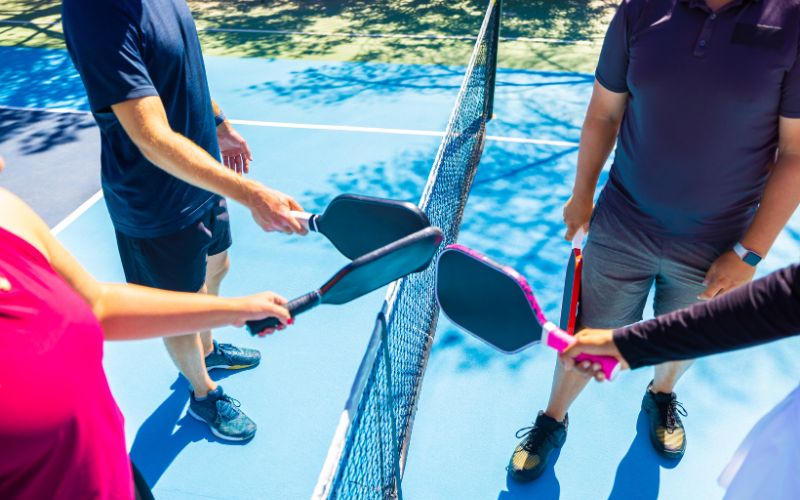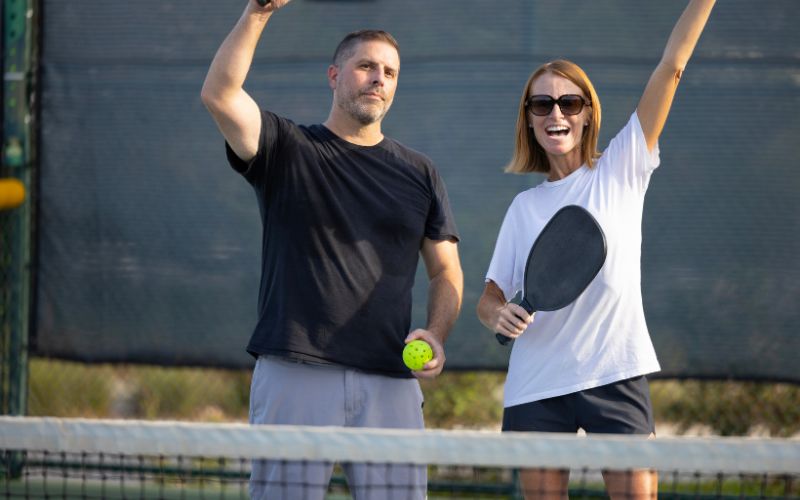Pickleball is more than just a sport; it’s a game that offers a plethora of mental health benefits to its players. As a combination of tennis, table tennis, and badminton, pickleball has gained popularity as one of the fastest-growing sports, captivating people of all ages. In this article, we will explore the numerous mental benefits associated with playing pickleball and delve into how this engaging sport contributes to overall mental well-being.
Playing Pickleball and Mental Health
Mental Health Playing Pickleball
The mental health benefits of playing pickleball are substantial, impacting various aspects of cognitive and emotional well-being. Engaging in regular sessions of pickleball can be a powerful tool in promoting mental health.
Emotional Health
One of the primary mental health benefits of pickleball is its positive impact on emotional well-being. The fast-paced nature of the game and the social interactions it fosters contribute to boosting mood and creating a sense of happiness and fulfillment.
Social Connections
Pickleball is not just a physical activity; it’s also a social sport. The game is often played in doubles, promoting teamwork and building social connections. The camaraderie developed on the pickleball court extends beyond the game, enhancing the overall social well-being of the players.
Cognitive Function and Pickleball
Improve Balance and Cognitive Function
The dynamic nature of pickleball, with its quick movements and strategic plays, contributes to the improvement of balance and cognitive function. This is particularly advantageous for individuals in middle age and older adults who want to keep their minds sharp and agile.
Hand-Eye Coordination and Brain Health
The precise nature of the game, involving the use of paddles and a wiffle ball, enhances hand-eye coordination, which is not only beneficial for the game but also has positive effects on overall brain health.
Table Tennis and Pickleball
The game combines elements of ping pong (table tennis), making it an ideal choice for those who enjoy the nuances of the sport. The coordination required to play pickleball has positive effects on brain activity, contributing to better cognitive function.
Physical Benefits Beyond the Pickleball Court
Maintain Healthy Bones
Engaging in regular pickleball practice helps individuals maintain healthy bones. The weight-bearing nature of the sport stimulates bone density, reducing the risk of osteoporosis and other bone-related issues.
Cardiovascular Health and Blood Flow
The cardiovascular benefits of playing pickleball extend to improved blood flow. The aerobic exercise involved in the game contributes to better circulation, promoting heart health and overall well-being.
Burn Calories and Weight Management
Pickleball is an effective way to burn calories, making it an excellent choice for those looking to manage their weight. The combination of physical activity and strategic gameplay provides a full-body workout, contributing to a healthy lifestyle.
Physical Activity
Playing pickleball is an excellent form of physical exercise that provides a wide range of health benefits. The game requires players to move constantly, engaging in aerobic exercise that contributes to better cardiovascular health.
Low Impact Sport
Unlike some high-impact sports, pickleball is a low-impact sport, making it suitable for individuals of all ages. The reduced risk of injuries associated with pickleball makes it an ideal choice for those looking to stay active without putting excessive strain on their bodies.
Hand-Eye Coordination and Balance
Pickleball is played on a small court, requiring players to develop and maintain hand-eye coordination and balance. These skills are crucial for maintaining a healthy body and are especially beneficial for older adults looking to improve their overall well-being.
Pickleball’s Impact on Mental Health Issues
Mental Illness and Pickleball
While pickleball is not a replacement for professional mental health care, it can be a complementary activity for individuals dealing with mental health issues. The social aspect of the game and the release of endorphins during physical activity can contribute to improved mental well-being.
Stress Relief and Well-Being
Engaging in a game of pickleball offers an effective outlet for stress relief. The focus required during play, combined with the social interactions, helps individuals achieve a sense of well-being and relaxation.
Pickleball Practice and Mental Health
Consistent engagement in pickleball practice has been linked to enhanced mental health. The structured nature of the game, coupled with the physical and social aspects, contributes to stress reduction and an overall improvement in mood.
Enhances the Hippocampus.
Engaging in physical activity safeguards the hippocampus, which is situated in the temporal lobes and plays a crucial role in memory formation. According to a study published in PNAS in 2011, participating in aerobic exercises like pickleball not only increases the hippocampus’s size but also enhances overall memory.
In addition, pickleball serves as a memory exercise as players need to recall the score and the serving order. While it may sound straightforward, scoring in pickleball presents challenges, particularly for beginners.
Points can only be scored during serving, and the server must verbally announce three numbers: their team’s score, the opposing team’s score, and a 1 or 2 to indicate their position as the first or second server on their team. Mastering the scoring system becomes a cognitive exercise that stimulates memory function.
Generates neurochemicals that uplift mood.
Engaging in high-intensity sports such as pickleball facilitates increased entry of the natural mood-enhancing amino acid L-tryptophan into the brain. L-tryptophan serves as the precursor to serotonin, a neurotransmitter that plays a crucial role in maintaining balanced moods.
Extensive research spanning decades indicates that participating in physical activities like pickleball not only contributes to the alleviation of depression and anxiety but also compares favorably to antidepressant medications for mild to moderate depression, according to a study published in The International Journal of Psychiatry in Medicine. The researchers further assert that physical activity presents an effective alternative treatment for anxiety disorders.
The Social Aspect of Pickleball
Pickleball is not just a game; it’s a social sport and a social game. The sense of community that develops among players is a powerful contributor to mental well-being. The shared experiences on the court create lasting connections that go beyond the game itself.
The community of pickleball players is diverse, welcoming individuals of all ages and skill levels. This inclusivity fosters a sense of belonging and strengthens the social fabric, positively impacting the mental health of those involved.
Pickleball for All Ages
Pickleball is a great sport for individuals of all ages. For older adults, it provides a low-impact form of exercise that helps maintain physical and mental well-being. For young people, it offers a dynamic and engaging activity that promotes a healthy lifestyle from an early age.
The existence of the pickleball association further reinforces the sense of community. The association promotes the sport, organizes events, and provides a platform for players to connect. This support structure contributes to the mental well-being of individuals involved in the sport.
Conclusion: Many Benefits of Pickleball
In conclusion, the mental benefits of pickleball are undeniable. From the physical exercise that contributes to cardiovascular health to the cognitive challenges that enhance brain function, pickleball offers a holistic approach to well-being. The social connections forged on the court add an extra layer of fulfillment, making it more than just a game. Whether you’re a seasoned player or just getting started, the potential benefits of pickleball for your mental health are vast. So, grab a paddle, step onto the court, and experience the joy and well-being that come with playing this fantastic sport.

FAQs: The Mental Benefits of Pickleball
1. How does playing pickleball contribute to mental health?
Playing pickleball offers numerous mental health benefits, including improved mood, reduced stress, and enhanced overall well-being. The combination of physical activity, social interaction, and cognitive engagement during gameplay contributes to a positive mental outlook and a sense of fulfillment.
2. What role does pickleball play in promoting emotional well-being?
Pickleball’s fast-paced nature and the social connections it fosters contribute to boosting mood and creating a sense of happiness and fulfillment. Engaging in regular sessions of pickleball can be a powerful tool in promoting emotional well-being by providing a fun and stimulating outlet for self-expression and camaraderie.
3. How does pickleball enhance social connections and community?
Pickleball is not just a physical activity; it’s also a social sport that promotes teamwork and builds social connections. Whether playing in doubles or joining community events, pickleball provides opportunities for players to interact, bond, and form lasting friendships. The sense of community among pickleball players contributes to overall mental well-being by fostering a supportive and inclusive environment.
4. What physical benefits does pickleball offer beyond mental health?
In addition to its mental health benefits, pickleball provides a wide range of physical benefits, including improved cardiovascular health, enhanced hand-eye coordination, and better bone density. The low-impact nature of the sport makes it suitable for individuals of all ages and fitness levels, making pickleball an excellent choice for maintaining overall physical and mental well-being.
5. How does pickleball stimulate cognitive function and memory?
Pickleball’s dynamic gameplay and strategic elements contribute to the improvement of balance, cognitive function, and memory. The precision and coordination required during play challenge the brain, stimulating neural pathways and enhancing overall cognitive function. Additionally, the scoring system in pickleball serves as a cognitive exercise that stimulates memory function, contributing to better cognitive health and mental acuity over time.







